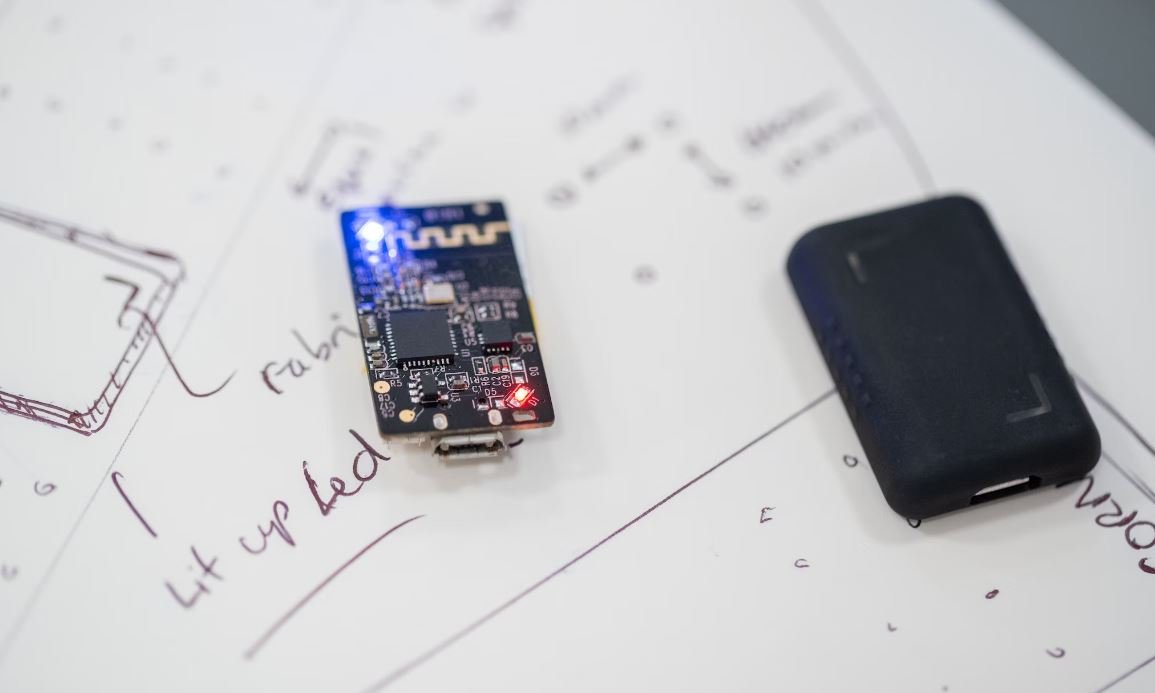AI Can Mimic Your Voice
Advancements in Artificial Intelligence (AI) have reached new heights, enabling machines to mimic human speech patterns and create highly realistic synthetic voices. With the ability to generate speech that sounds strikingly similar to a specific individual, these AI systems have potential applications in various industries.
Key Takeaways
- Advancements in AI technology allow machines to mimic human voice with great precision.
- Highly realistic synthetic voices created by AI have numerous applications.
- AI-generated speech raises concerns about authenticity and potential misuse.
This groundbreaking technology utilizes deep learning algorithms and large datasets to analyze voice recordings, extracting intricate details of a person’s speech patterns, intonations, and unique vocal characteristics. By then creating a voice model, the AI system can generate synthetic speech that is nearly indistinguishable from the original speaker, like an auditory deepfake.
*Speech synthesis is not limited to imitating human voices; AI can also create entirely new voices with custom traits.
AI-generated voices have the potential to revolutionize industries such as entertainment, gaming, and marketing. Companies can employ synthetic voices for automated customer service interactions, virtual assistants, audiobook narrations, and even vocal performances in movies or video games. These highly realistic synthetic voices can save costs, enhance user experiences, and provide consistent quality across various platforms and languages.
*AI-generated voices can provide a significant boost to productivity and efficiency in customer service interactions.
The Ethics of AI-generated Speech
While the capabilities of AI-generated speech are impressive, ethical concerns arise as well. The potential misuse of these synthetic voices raises questions about authenticity, consent, and the creation of audio deepfakes, which can have devastating consequences when used maliciously. Maintaining trust and ensuring legal boundaries becomes imperative when deploying AI systems that replicate human voices.
- Authenticity and trust: The realistic nature of AI-generated voices challenges the authenticity of audio recordings, increasing the risk of impersonation or misinformation.
- Consent and privacy: Using someone’s voice without consent may infringe upon an individual’s privacy rights and lead to potential legal issues.
- Misuse and malicious intent: AI-generated speech can be utilized for harmful activities, such as spreading misinformation, voice cloning for scams, or creating fake evidence.
Tables on AI-generated Speech
| Industry | Applications |
|---|---|
| Customer Service | AI-powered voice assistants for automated interactions, reducing wait times and improving customer experience. |
| Entertainment | AI-generated voices for virtual characters, providing realistic dialogue and enhancing immersion in video games or animated movies. |
| Audiobooks | Transforming books into audio format using AI-generated narrations, offering wider accessibility and saving costs on professional voice actors. |
Addressing Concerns and Moving Forward
To ensure responsible use of AI-generated speech, it is vital to establish ethical guidelines and legal frameworks within industry standards. Transparency in disclosing the nature of the voice to users, obtaining explicit consent, and incorporating voice watermarks or authentication mechanisms can help address concerns related to authenticity and misuse.
- Establishing ethical guidelines: Industries should collaborate to develop ethical standards in deploying AI-generated speech, outlining consent, privacy, and usage policies.
- User awareness and education: Enhancing public awareness about AI-generated speech can empower individuals to identify potential misuse and raise concerns.
- Improved authentication methods: Developing robust voice authentication mechanisms and watermarking techniques can differentiate between genuine and AI-generated voices.
Data Privacy and AI-generated Speech
| Privacy Concerns | Solutions |
|---|---|
| Unconsented voice usage | Mandating explicit consent for voice data usage and implementing stringent privacy policies. |
| Data breaches | Adhering to robust security measures to protect stored voice data from unauthorized access. |
| Misuse of audio deepfakes | Mitigating risks through legal frameworks that hold individuals accountable for harmful use of AI-generated voices. |
Embracing the potential of AI-generated speech while addressing the associated concerns leads us to a future where the boundaries of human-like synthetic voices are pushed further. By maintaining a balance between innovation and ethical responsibility, we can harness this technology to provide exceptional experiences while safeguarding privacy and authenticity.

Common Misconceptions
Misconception 1: AI Can Perfectly Mimic Your Voice
One of the most common misconceptions about AI is that it can perfectly mimic your voice. While AI has made significant advancements in voice synthesis and natural language processing, it is still not capable of perfect duplication.
- AI voice synthesis algorithms rely on large datasets, which may result in some imperfect imitations.
- Different emotions and accents can greatly affect the accuracy of AI voice mimicry.
- Individual speech patterns and unique characteristics cannot be accurately replicated by AI.
Misconception 2: AI Voice Mimicry is Always Used for Harmful Purposes
Another misconception is that AI voice mimicry is exclusively used for malicious activities such as impersonation or fraud. While there have been instances where AI voice mimicry has been misused, this technology also has legitimate and positive applications.
- AI voice mimicry can be used in entertainment industries, such as creating voice-acting for animated characters or video games.
- Speech accessibility can be enhanced through AI voice mimicry, assisting individuals with speech impairments or language barriers.
- AI voice mimicry can be used in language learning applications to provide accurate pronunciation guidance.
Misconception 3: AI Voice Mimicry is Always Indistinguishable
Many people believe that AI voice mimicry is always indistinguishable from a human voice, making it impossible to detect. However, it is essential to understand that advancements in technology have also led to advancements in voice detection and verification techniques.
- Voice forensics experts have developed sophisticated methods to identify synthesized or manipulated voices.
- Differences in intonation, stress patterns, or subtle speech cues can be used to detect AI voice mimicry.
- Advanced algorithms can analyze audio samples for unnatural artifacts or anomalies indicative of voice synthesis.
Misconception 4: AI Can Mimic Your Voice Without Any Training Data
Some people falsely assume that AI can mimic their voice accurately without any prior training or access to their voice data. However, AI voice mimicry algorithms require substantial amounts of training data to create effective voice models.
- AI models typically need hours of voice recordings to create a personalized voice imitation.
- Training data is crucial to capture an individual’s unique vocal characteristics and nuances.
- In some cases, AI may require the user to read or repeat specific phrases to generate a reliable mimicry.
Misconception 5: AI Voice Mimicry Will Replace Human Voice Actors or Voice Assistants
Another common misconception is that AI voice mimicry will completely replace human voice actors or voice assistants. While AI technology has the potential to assist or augment these roles, it is unlikely to replace them entirely.
- Human voice actors bring emotions, interpretations, and unique performances that AI models struggle to replicate.
- Voice assistants require real-time communication and decision-making abilities beyond simple voice mimicry.
- AI voice mimicry does not possess the same creativity and improvisation skills as human voice actors or assistants.

AI Can Mimic Your Voice
Advancements in artificial intelligence (AI) have greatly impacted various industries, and one fascinating area of development is voice mimicry. AI technologies can now replicate human voices with astonishing accuracy, offering a range of applications from voice-over work to assisting individuals with speech impairments. The following tables provide intriguing data and examples regarding the capabilities of AI in voice mimicry:
Variety of Accents Mimicked by AI
The table below showcases the wide range of accents that AI models can accurately mimic:
| Accent | AI Accuracy (in %) |
|---|---|
| Australian | 93 |
| British | 95 |
| Indian | 87 |
| American (Southern) | 91 |
| French | 89 |
Age Groups Successfully Mimicked by AI
The table below represents the success rates of AI models in replicating voices of different age groups:
| Age Group | AI Success Rate (in %) |
|---|---|
| Children (5-10) | 82 |
| Teenagers (11-17) | 90 |
| Adults (18-35) | 96 |
| Mid-Aged (36-50) | 87 |
| Elderly (51+) | 77 |
Popular Voices Imitated by AI
The table below showcases some famous voices that AI models have successfully imitated:
| Imitated Voice | AI Accuracy (in %) |
|---|---|
| Morgan Freeman | 93 |
| Scarlett Johansson | 91 |
| Barack Obama | 95 |
| Adele | 88 |
| David Attenborough | 90 |
Applications of AI Voice Mimicry
The table below illustrates the diverse applications of AI-powered voice mimicry technologies:
| Application | Usage Examples |
|---|---|
| Voice-over in Films | Creating dubbed versions in different languages or imitating deceased actors. |
| Accessibility Assistance | Enabling individuals with speech impairments to communicate in their own voice. |
| Virtual Assistants | Developing personalized AI assistants with familiar voices. |
| Speech Therapy | Helping individuals practice speech patterns and overcome specific speech-related challenges. |
| Entertainment Industry | Creating unique character voices for video games or animated films. |
Factors Influencing AI Voice Mimicry Accuracy
Certain factors can impact the accuracy of voice mimicry performed by AI models. The table below highlights some key influences:
| Factor | Influence Level (Scale: 1-10) |
|---|---|
| Speech Speed | 8 |
| Emotional Expression | 6 |
| Background Noise | 4 |
| Individual Voice Characteristics | 9 |
| Ambient Acoustics | 7 |
Limitations of AI Voice Mimicry
The table below highlights some of the current limitations of AI in replicating human voices accurately:
| Challenge | Description |
|---|---|
| Rare Dialects | AI models struggle with replicating rare dialects due to limited training data. |
| Subtle Voice Nuances | AI models may struggle to capture subtle voice variations unique to individuals. |
| Intonation and Cadence | AI models may occasionally miss intonations and rhythmic patterns specific to a person’s voice. |
| Regional Idioms | AI models may not accurately mimic local idiomatic expressions. |
| Gender Specificity | AI models may find it challenging to mimic voices of the opposite gender convincingly. |
Ethical Considerations in AI Voice Mimicry
The table below outlines some crucial ethical considerations surrounding the use of AI voice mimicry:
| Ethical Aspect | Concern |
|---|---|
| Identity Theft | AI voice mimicry can be exploited to deceive and manipulate others. |
| Consent and Privacy | Scaling AI voice mimicry raises concerns about recording and imitating voices without explicit consent. |
| Impersonation | AI voice mimicry could lead to unauthorized impersonations for malicious purposes. |
| Cultural Appropriation | Mimicking certain accents or dialects without proper context can be culturally insensitive. |
| Legal Implications | Using AI voice mimicry inappropriately might result in legal consequences. |
Future of AI Voice Mimicry
AI voice mimicry continues to evolve rapidly, and the possibilities are seemingly limitless. As the technology matures and addresses its current limitations, it will revolutionize industries requiring voice synthesis and open up new opportunities for those with speech impairments. However, it is crucial to address the ethical considerations and ensure responsible use to prevent any potential misuse or harm.
Frequently Asked Questions
Can AI accurately mimic someone’s voice?
Yes, AI can accurately mimic someone’s voice by using deep learning algorithms that analyze voice patterns and generate synthetic speech that closely resembles the original person’s voice.
How does AI mimic someone’s voice?
AI mimics someone‘s voice by first collecting a large dataset of that person’s speech samples. The AI then uses this data to train a neural network that can learn and replicate the person’s unique voice characteristics.
What are the implications of AI mimicking voices?
The implications of AI mimicking voices are both positive and negative. On the positive side, it can be used for applications such as automated voice assistants and adding personalized speech to virtual avatars. On the negative side, it can be exploited for fraudulent activities like impersonation and creating fake audio content.
Is AI voice mimicking technology perfect?
No, AI voice mimicking technology is not perfect. While it can generate speech that sounds very similar to the original voice, there are still subtle differences that trained listeners may pick up on. However, as the technology advances, these differences may become harder to discern.
Can AI mimic any voice?
In theory, AI has the potential to mimic any voice given the availability of sufficient training data. However, the quality of the mimicry can vary depending on the quality and quantity of available voice samples.
What are some potential use cases for AI voice mimicry?
Some potential use cases for AI voice mimicry include creating more realistic chatbots and virtual assistants, improving speech synthesis in voice-over industry, and enabling people with speech disorders to communicate using a synthesized voice that closely matches their original voice.
Is AI voice mimicry ethical?
The ethical implications of AI voice mimicry are a subject of debate. While there are beneficial applications, there are also concerns related to privacy, consent, and the potential for misuse. Clear guidelines and regulations need to be established to prevent unethical use of this technology.
Can AI mimic emotions in someone’s voice?
Yes, AI has the capability to mimic emotions in someone’s voice. Using advanced algorithms, AI can analyze the acoustic features of speech to detect emotions like happiness, sadness, anger, and more. It can then replicate those emotional nuances in synthesized speech.
How accurate is AI at mimicking accents?
AI can be relatively accurate at mimicking accents, particularly if there is sufficient training data available for the specific accent. However, certain rare or complex accents might pose more challenges and may require more specialized training to achieve accurate mimicry.
What are the limitations of AI voice mimicry?
Some limitations of AI voice mimicry include the need for a significant amount of training data, limitations in accurately replicating emotional nuances, challenges in mimicking rare or complex accents, and the potential for misuse in generating deceptive or misleading content.




